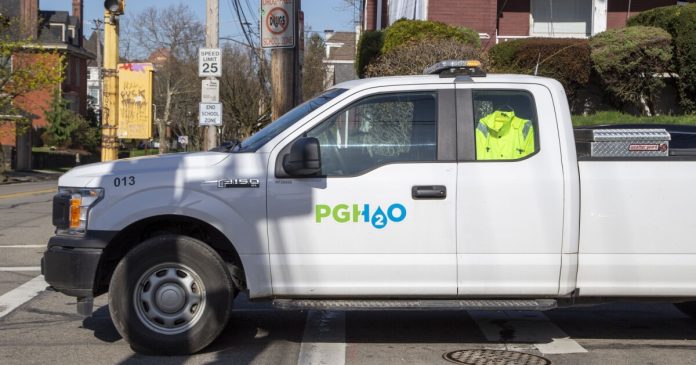The cost of drinking water and sewage in Pittsburgh keeps rising, as the Pittsburgh Water and Sewage Authority and the Allegheny County Sanitary Authority continue to raise rates. Both are in the midst of paying for generational repairs to their aging infrastructure.
This week the Pittsburgh Water and Sewer Authority [PWSA] announced a new pilot program to help its lowest income customers keep up with their bills.
PWSA already gives a $35 discount per month to low-income customers. If low-income customers fall behind, they can receive an additional $30 credit on their bills each month for getting on a payment plan and sticking with it. PWSA will also provide up to $300 in additional hardship assistance per year. That’s just a few of the biggest benefits and discounts for customers signing up to PWSA’s low-income assistance program.
But even at a discounted rate, water bills can make life difficult for low income customers if they spring an unexpected leak, according to Julie Mechling, the director of customer service for PWSA. So PWSA launched a new pilot program that will pay for plumbers to go into their homes and repair leaks.
“It’s really a burden for that customer who’s already struggling to meet their finances, deciding whether they’re going to buy groceries or pay their medical bills and trying to keep all their utilities afloat,” she said. “It’s really a struggle for them to have one more thing, one more cost added to their monthly budget that they weren’t aware of, that they didn’t budget for because they didn’t think that they would potentially have any problems.”
Now any customer that makes 150 percent of the poverty level or less are eligible for the free service. A family of four that earns $45,000 or less would be eligible. The more than 6,000 PWSA customers who are already signed up for bill payer assistance are already eligible.
Mechling said any drinking water customers can call and sign up for the program if they believe they have a leak or their water usage seems unusually high. PWSA already tracks the water usage of its customers and reaches out when they have reason to believe there is a leak. Customers can also sign up on PWSA’s website to get immediate leak notifications. Now the authority has an additional tool it can offer low-income customers who might struggle to come up with money to pay for a plumber right away.
The pilot program will pay its contractor, Mitchell Plumbing, up to $1,356 to perform repairs on exposed plumbing inside eligible homes. The program won’t pay for any leaks that require digging or demolition to fix. The work comes with a one-year warranty.
A dozen families have already been helped since the program launched at the beginning of September, according to Mechling. One family, for example, had a shower valve that was constantly running and when the plumber tried to make a repair, the part snapped. They ordered a new part and the repair was made the following day.
PWSA didn’t announce the program publicly until they had worked out any kinks but Mechling said so far there haven’t been any issues. She expects that in the future they might run into some landlords who won’t sign the paperwork allowing for the repairs, or who can’t be reached. This is the first time PWSA has done work on property they don’t own, Mechling said, and so they have to get a legal agreement signed by the owner. But the pilot program is open to renters and owners, as long as the owner agrees to the work.
The pilot has funding to serve at least 239 low-income customers. But because not every repair costs the allotted amount, the pilot could potentially serve additional customers. Or, if there is additional money at the end of the trial, they could offer additional repair services to homes where the repair costs exceeded the initial program limit of $1,356.
The pilot program was created through a settlement agreement with the Pennsylvania Public Utility Commission (PUC) in a process that was begun more than a year and a half ago, Mechling said. It’s very common to require electric and gas utilities to help low-income customers conserve energy in their homes, but there isn’t a similar requirement for drinking water utilities. Mechling isn’t aware of any other drinking water suppliers in Pennsylvania that run a similar program.
PWSA is tracking a number of variables in the trial, including how much money customers save compared to a control group, as well as whether it reduces the likelihood of their water being shut off. The authority will use that data to answer questions about how much value customers are getting and how much money to budget for in the future if the program is made permanent. The pilot is being paid for by ratepayers, and establishing a permanent program would require PUC approval.
For more information customers can visit www.pgh2o.com/CAP, email cares@pgh2o.com, or call 412-255-2457.
www.wesa.fm
https://www.wesa.fm/economy-business/2023-09-28/new-pwsa-program-will-pay-for-plumbing-repairs-in-some-pittsburgh-homes













